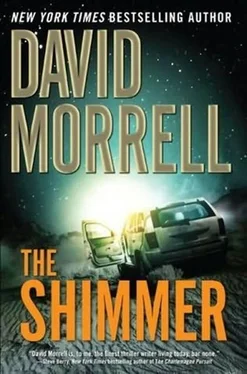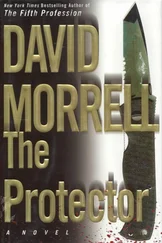Page stared at the splintered boards lying on the ground. “Why hasn’t any of this been talked about?”
“Deacon’s death really traumatized everyone associated with the movie. They didn’t claim to understand him, but they respected his brilliance, and they didn’t want to tarnish his legacy by claiming that he was wasted on booze and drugs. They certainly weren’t going to make him sound like a nutcase by mentioning the lights, which no- body believed in anyhow.”
Harriett lapsed into silence. In the hot sun, the only sounds were cattle lowing in the distance and a breeze scraping blades of scrub grass.
“So the lights inspired Deacon, and then he became so obsessed by them that he was destroyed?” Tori asked.
“It depends on what you mean by destroyed. That final performance bordered on greatness,” Harriett answered.
“But the bottom line is, he died,” Tori emphasized.
“It could be that’s what Deacon wanted. Maybe he’d lived so in- tensely during the previous year that he couldn’t bear it any longer.”
“You’re suggesting…?”
“The glint on the windshield of the truck he hit. Maybe he was so burned out that he decided to drive into the light.”
The breeze faded, everything becoming still.
“Yesterday you told us how blessed the people in town feel because they’ve seen the lights,” Page said.
“That was my experience.”
“But not everybody’s experience,” Page added. “Is it possible to have too much of a good thing? In town, I heard a store clerk say that when she was young, she used to go out to see the lights, but now she never does. Yesterday you said you stopped going out to see them, also.”
Harriett looked pointedly at Tori. “When Chief Costigan phoned yesterday to say you were coming to see me, he explained how fixated you are on the lights. I brought you here to try to make you under- stand that, yes, it’s possible to have too much of a good thing.”
The crackle of static woke him.
As did his headache.
And the odor.
Halloway lifted the side of his face from a table. His cheek was numb from having been pressed so long against the wood. The ear- phones remained on his head. He felt groggy, as if he’d drunk every one of the numerous glasses of vodka and orange juice that the alluring music had made him imagine.
The scent of cinnamon remained in his nostrils. He sensed the lingering warmth of the voluptuous woman with whom he had slow danced in his fantasy.
And danced, and danced…
Until he’d passed out.
Halloway was slumped across a desk. When he straightened, he felt wetness in the front of his pants. He raised his head toward the painfully bright overhead lights and took off the staticky earphones. Exposed to air after so long a time, his ears tingled. He’d hoped that- without the aggravating crackle-his headache would lessen, but in fact the pain burrowed deeper into his skull because the crackle no longer kept him from hearing the hum that radiated from every surface of the underground facility.
If I can only find what’s causing it.
But Halloway ‘s headache wasn’t the only thing that had intensified. The odor now almost made him gag.
He peered down at the bodies. So many bodies. The scientists. The other guards. Their blood covered the floor, the stench reminding him of a butcher’s shop through which he and his Ranger unit had searched for insurgents in Iraq. The electricity to that part of Fallujah had failed, and the meat had been spoiling in the extreme heat.
Here in the observatory, the blood wasn’t the worst of it. Foul- smelling body fluids had leaked from several of the corpses. The faces of some had begun to distend.
That shouldn’t be happening so soon, Halloway thought. He glanced at his watch and saw that the hands showed seven minutes to 4. His outburst had occurred around 9:30. His muddled thoughts somehow did the math. Less than seven hours.
At once a suspicion made him stand. Uneasy, he stepped over the bodies, doing his best to avoid the blood. He entered the corridor and found another dead guard, this one with features so mutilated by bullets that his face wasn’t recognizable.
Halloway turned right and walked along the corridor, the loud echo of his bootsteps failing to shut out the hum. He entered the surveillance room, his mouth dropping open when he saw the images on the monitors. None had the green tint of a night-vision camera. The radio dishes, the three rows of fences, the miles and miles of scrub grass, the distant mountains-all were bathed in the hot glare of sunshine.
Not seven hours, he thought in shock. Nineteen.
Dear God, I’ve never slept that long in my life.
The phone rang. It was one of only four in the facility, all of which were scrambler-equipped. He stared at it and, on the second ring, picked it up.
“Station Zulu,” he said.
“This is Alpha Control,” a man’s voice said impatiently. “Identify yourself.”
“Earl Halloway. I’m one of the guards.”
“Halloway,” the voice responded. “Former Ranger sergeant. Saw combat in Iraq.”
Halloway recognized the steely, authoritative tone. It belonged to the man who led the team that had arrived via chopper yesterday afternoon. Colonel Raleigh. “Yes, sir.”
“Well,former Sergeant Halloway-” Raleigh’s voice exuded venom. “-I’ve been trying to contact your station for the past six hours. Why in Christ’s name isn’t anybody answering the phone?”
The heat of adrenaline cleared Halloway’s groggy thoughts. “Sir, there was a thunderstorm last night.” He had a vague memory of hearing the periodic rumbles as he drank vodka and orange juice, smelled cinnamon, and danced.
“I know all about the damned storm. I’m only twenty miles away from you. We were caught in it, too.”
“Well, sir, we got struck by lightning.” He was thinking faster now. “It interfered with our communications capabilities.”
“You’re telling me that some of the best scientists working for the government don’t have the combined skills needed to repair the dam- age from an electrical storm? That facility is grounded all the way to hell. I find it hard to believe that a lightning strike would have any effect whatsoever.”
“Sir, with all due respect, I’m not a communications specialist. I’m just repeating what the technicians told me. They took until now to repair the damage.”
“And meanwhile, no data was received or transmitted to Fort Meade?” The colonel’s voice sounded even more infuriated.
“I’m told that’s correct, sir.”
“Damn it, when this is over, I’m going to find out who didn’t do his job. Right now, I want you to transfer this call to the control room.”
Halloway felt a moment’s panic. “Sir, I’m afraid I can’t do that.”
“Can’t? What are you talking about?”
“The phone I’m using, the one in the surveillance room, is the only one that’s been put back into service.”
The line became silent. Halloway imagined that he could feel the colonel’s growing fury. He was glad to have a safe distance between them.
“Former Sergeant Halloway, I want you to go to the control room and bring Gordon to the phone.”
“Sir? Are you there, sir? I can’t hear you.”
“What do you mean you can’t hear me?”
“Sir?”
“Damn it, I can hear you perfectly fine,” Raleigh replied, his voice getting louder.
“Sir? If you’re still on the line, you’re not coming through. The sys- tem must be failing again.”
“Bring Gordon to the phone, Sergeant!”
“Sir? Sir?”
Halloway set the phone back on its cradle, breaking the connection.
He looked down at the floor and concentrated. Then he returned to the corridor and made his way back to the control room. Although he was combat-hardened from two tours of duty in the most violent parts of Iraq, the stench made him gag.
Читать дальше












